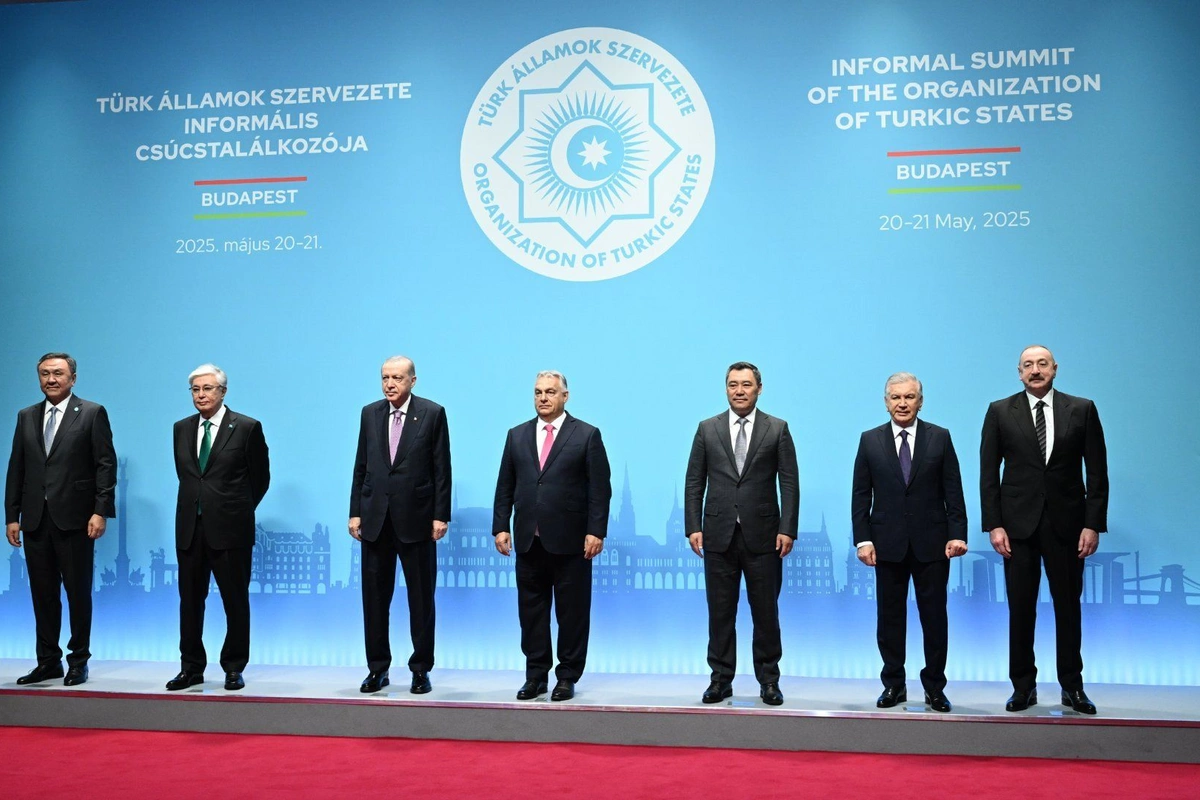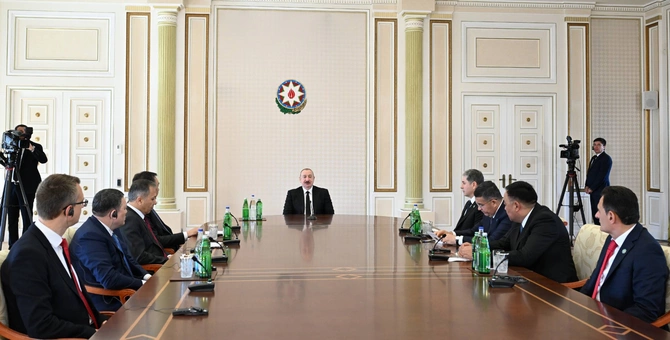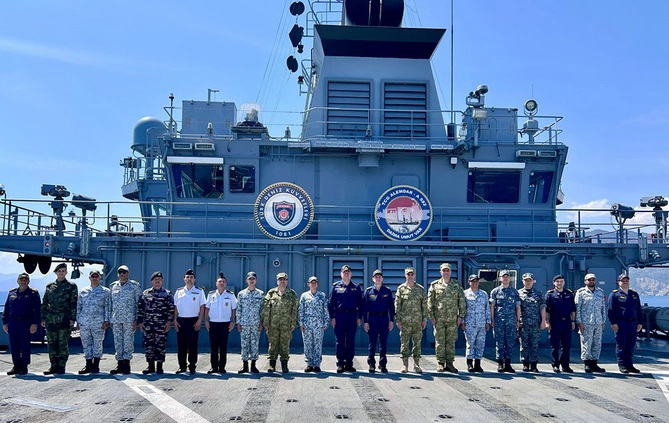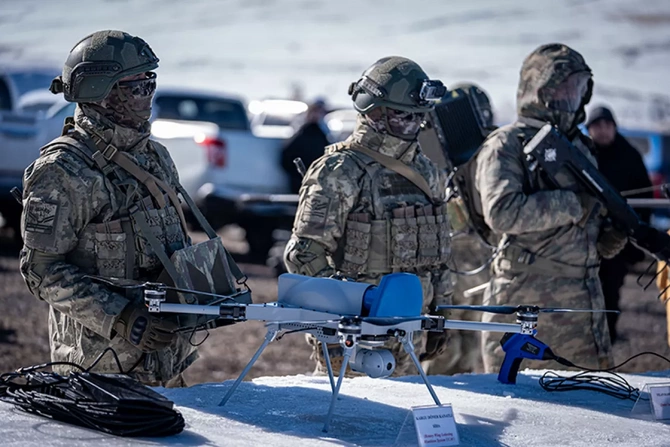
Photo credit: Azernews
One of the key international events of the past week was the Informal Summit of the Organization of Turkic States (OTS) held in Budapest, which concluded with the adoption of a 71-point Declaration. Among its provisions, analysts of various backgrounds have highlighted the commitment to expanding productive multilateral cooperation in the field of defense industry within the framework of the OTS.
Notably, immediately following the Budapest Summit, President of Azerbaijan Ilham Aliyev received the participants of the second meeting of the OTS Ministers of Internal Affairs. Identifying the transformation of the OTS into one of the leading political organizations on the global stage as a primary objective, President Aliyev underscored the importance of maintaining stability in OTS member states through coordinated action by internal affairs and law enforcement agencies, especially given the persistent and emerging global threats, challenges, and external interference.

On May 23, President of the Republic of Azerbaijan Ilham Aliyev received a delegation of participants of the second meeting of the Ministers of Internal Affairs of the Organization of Turkic States (OTS) / Photo credit: president.az
According to several experts, defense cooperation among OTS member states has become one of the foundational pillars of the organization. During the 10th OTS Summit in Astana (2023), President Aliyev described defense capability as the main guarantor of security for the member states, stressing the ongoing violations of international law and the existence of bloody conflicts. Against this backdrop, he called for enhanced cooperation among OTS countries in security, defense, and the defense industry. At the 11th Summit in Bishkek, he further emphasized the need to expand cooperation among law enforcement and security agencies of the Turkic states and stressed the importance of conducting joint military exercises “with the participation of the armed forces of our countries.”
In this context, particular attention should be paid to provisions of the “Karabakh Declaration,” signed in Shusha in 2024 during the Informal OTS Summit. The declaration affirmed the member states' shared commitment to harnessing the full potential of Turkic nations in the defense-industrial domain with the aim of “developing a collective OTS strategy.”
Practical implementation of these intentions is already evident. On April 15, Hulusi Akar, Chairman of the Turkish Parliament's National Defense Committee, noted the continued efforts to align the Azerbaijani army and its personnel with the Turkish model, emphasizing the strengthening of defense cooperation and the importance of joint military drills.
This theme was further explored on May 21 during a meeting at Azerbaijan’s Ministry of Defense with a Turkish delegation led by the Commander of the Turkish Land Forces’ 1st Army. The parties emphasized the importance of applying cutting-edge technological innovations during the exercises. The following day, it was announced that joint electronic warfare exercises would be held in the Turkish city of Konya on May 26. These drills are set to follow the multinational search-and-rescue exercise “Anatolian Phoenix-2025,” which took place in Konya from May 12 to 23, with the participation of Azerbaijani Air Force pilots, paratroopers, and search-and-rescue specialists from the Ministry of Defense.
Earlier, the KURTARAN-2025 underwater search-and-rescue exercises were conducted in Marmaris, Türkiye, with a group of Azerbaijani Navy personnel observing. Notably, “Anatolian Phoenix-2025” successfully showcased the capabilities of the Turkish defense industry in field conditions. One remarkable highlight was the first-ever one-ton bomb drop carried out by a HÜRKUŞ aircraft.

A group of Azerbaijan Naval Forces personnel participated as observers in KURTARAN-2025 Submarine Escape & Rescue Exercise held in Marmaris, Türkiye/ Photo credit: mod.gov.az
In the Kazakhstan context, it should be noted that at the beginning of 2025, the defense ministries of Kazakhstan and Türkiye approved a military cooperation plan for the year. Last month, a planning conference for the joint drone exercise “Tarlan-2025” was held at an Azerbaijani Air Force base, with the participation of a delegation from the Kazakhstan Armed Forces’ UAV Deployment and Development Department.
This month, the Turkish Embassy in Kazakhstan declared that defense industrial cooperation between the two countries has reached a “strategic level.” It was clarified that in light of Kazakhstan’s military modernization, many Turkish defense products are already in use in Astana. Furthermore, the cooperation extends beyond deliveries to include joint production and technology transfer. In parallel, military officials from Kazakhstan and Türkiye held discussions in Ankara on joint exercises and collaboration in military education.
In May, under the 2025 bilateral cooperation plan between the Azerbaijani and Kazakh defense ministries, a delegation from Kazakhstan’s General Staff held meetings at Azerbaijan’s Combat Control Center and visited command posts of the Air and Naval Forces.
Turning to Uzbekistan, back in December 2024, President Shavkat Mirziyoyev approved a law ratifying the agreement on cooperation in the defense industry with Türkiye. In January 2025, within the framework of the Ankara Declaration signed by Uzbekistan, Azerbaijan, and Türkiye, the parties reaffirmed their unwavering support for each other’s territorial integrity and the inviolability of borders, as well as their commitment to strengthening cooperation on matters of shared regional and international concern - a message that speaks for itself.
As a result, in late January-early February 2025, Kazakhstan, Uzbekistan, Azerbaijan, and Türkiye, along with Bosnia and Herzegovina and Georgia, held large-scale military exercises “Kış-2025” in Kars, Türkiye. The main objective of the drills was to enhance the combat readiness and interoperability of the participating armed forces in the context of regional security. For Kazakhstan and Uzbekistan, participation in “Kış-2025” marked a significant step forward in their military cooperation with Türkiye. Notably, at the beginning of the year, Uzbekistan signed a contract to purchase ANKA SIHA military drones produced by Turkish aerospace company TUSAŞ.

Finally, in May, following the April meeting between the defense ministries of Azerbaijan and Uzbekistan, the relevant structures of both countries reaffirmed their commitment to regularly exchanging views on the development of military-technical cooperation in the defense industry.
Taken together, these developments clearly indicate the growing prominence of the defense dimension within the OTS. In an era of continued global geopolitical turbulence, this trend should come as no surprise. Beyond maintaining internal stability and public order, OTS member states must also possess the capacity to deter and respond to external threats and challenges. In this light, the military paradigm is increasingly emerging as a crucial element in strengthening the Organization of Turkic States.
Share on social media